Trade Policy Critique: Trump's Policies and Economic Theory Analysis
VerifiedAdded on 2023/04/19
|6
|1457
|329
Case Study
AI Summary
This case study provides a critical analysis of President Donald Trump's trade policies, particularly the imposition of tariffs on imports and the rejection of free trade agreements. It examines these policies through the lens of economic theories such as comparative advantage and absolute advantage, referencing the works of economists like Adam Smith and David Ricardo. The analysis identifies key issues, including protectionism, free trade, and the potential negative consequences of trade restrictions. It further evaluates the consistency of the article's arguments with established economic principles, while also noting the absence of a balanced perspective that considers the potential justifications for protectionist measures. Desklib offers a platform to access this case study, alongside a wealth of other academic resources, including past papers and solved assignments, to support students' learning and research needs.
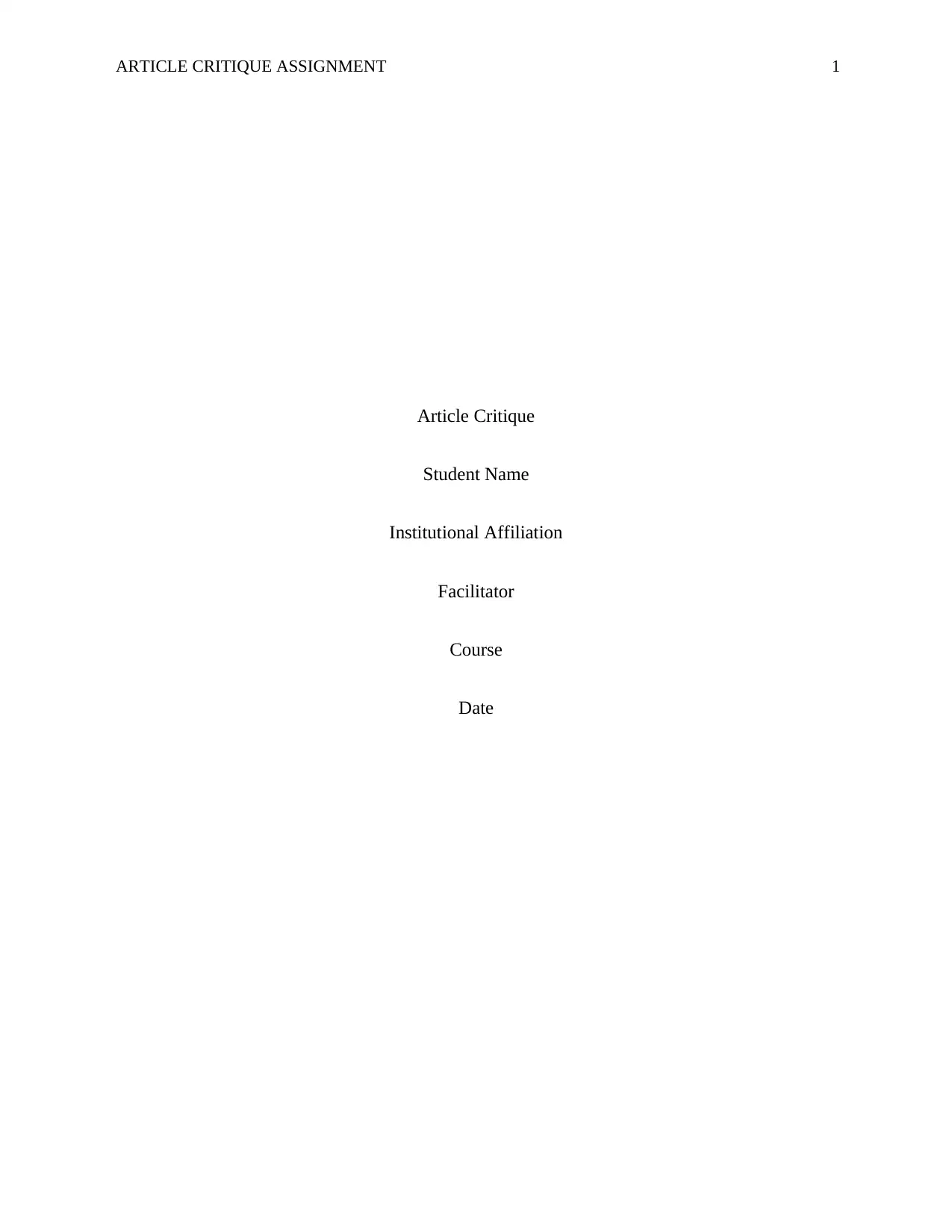
ARTICLE CRITIQUE ASSIGNMENT 1
Article Critique
Student Name
Institutional Affiliation
Facilitator
Course
Date
Article Critique
Student Name
Institutional Affiliation
Facilitator
Course
Date
Paraphrase This Document
Need a fresh take? Get an instant paraphrase of this document with our AI Paraphraser
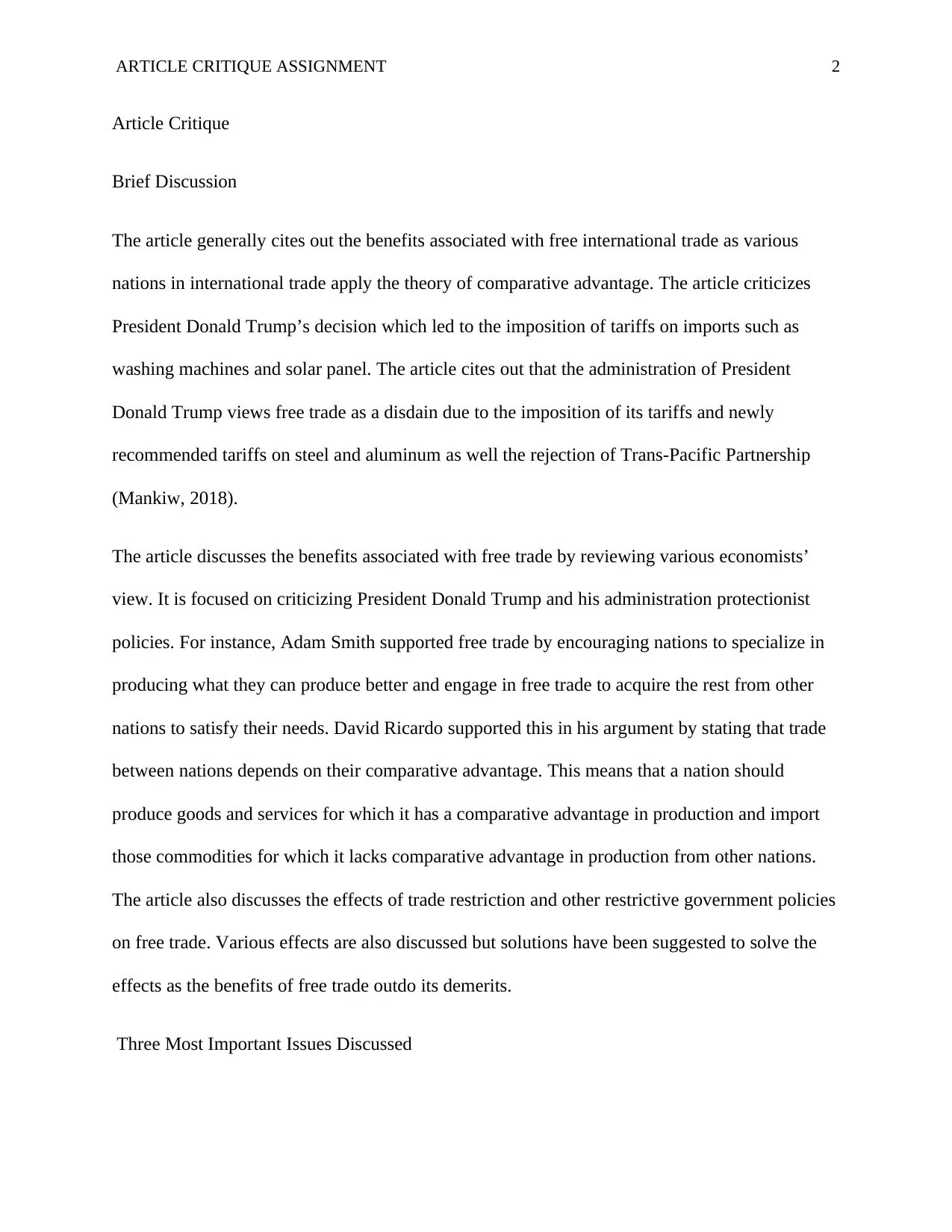
ARTICLE CRITIQUE ASSIGNMENT 2
Article Critique
Brief Discussion
The article generally cites out the benefits associated with free international trade as various
nations in international trade apply the theory of comparative advantage. The article criticizes
President Donald Trump’s decision which led to the imposition of tariffs on imports such as
washing machines and solar panel. The article cites out that the administration of President
Donald Trump views free trade as a disdain due to the imposition of its tariffs and newly
recommended tariffs on steel and aluminum as well the rejection of Trans-Pacific Partnership
(Mankiw, 2018).
The article discusses the benefits associated with free trade by reviewing various economists’
view. It is focused on criticizing President Donald Trump and his administration protectionist
policies. For instance, Adam Smith supported free trade by encouraging nations to specialize in
producing what they can produce better and engage in free trade to acquire the rest from other
nations to satisfy their needs. David Ricardo supported this in his argument by stating that trade
between nations depends on their comparative advantage. This means that a nation should
produce goods and services for which it has a comparative advantage in production and import
those commodities for which it lacks comparative advantage in production from other nations.
The article also discusses the effects of trade restriction and other restrictive government policies
on free trade. Various effects are also discussed but solutions have been suggested to solve the
effects as the benefits of free trade outdo its demerits.
Three Most Important Issues Discussed
Article Critique
Brief Discussion
The article generally cites out the benefits associated with free international trade as various
nations in international trade apply the theory of comparative advantage. The article criticizes
President Donald Trump’s decision which led to the imposition of tariffs on imports such as
washing machines and solar panel. The article cites out that the administration of President
Donald Trump views free trade as a disdain due to the imposition of its tariffs and newly
recommended tariffs on steel and aluminum as well the rejection of Trans-Pacific Partnership
(Mankiw, 2018).
The article discusses the benefits associated with free trade by reviewing various economists’
view. It is focused on criticizing President Donald Trump and his administration protectionist
policies. For instance, Adam Smith supported free trade by encouraging nations to specialize in
producing what they can produce better and engage in free trade to acquire the rest from other
nations to satisfy their needs. David Ricardo supported this in his argument by stating that trade
between nations depends on their comparative advantage. This means that a nation should
produce goods and services for which it has a comparative advantage in production and import
those commodities for which it lacks comparative advantage in production from other nations.
The article also discusses the effects of trade restriction and other restrictive government policies
on free trade. Various effects are also discussed but solutions have been suggested to solve the
effects as the benefits of free trade outdo its demerits.
Three Most Important Issues Discussed
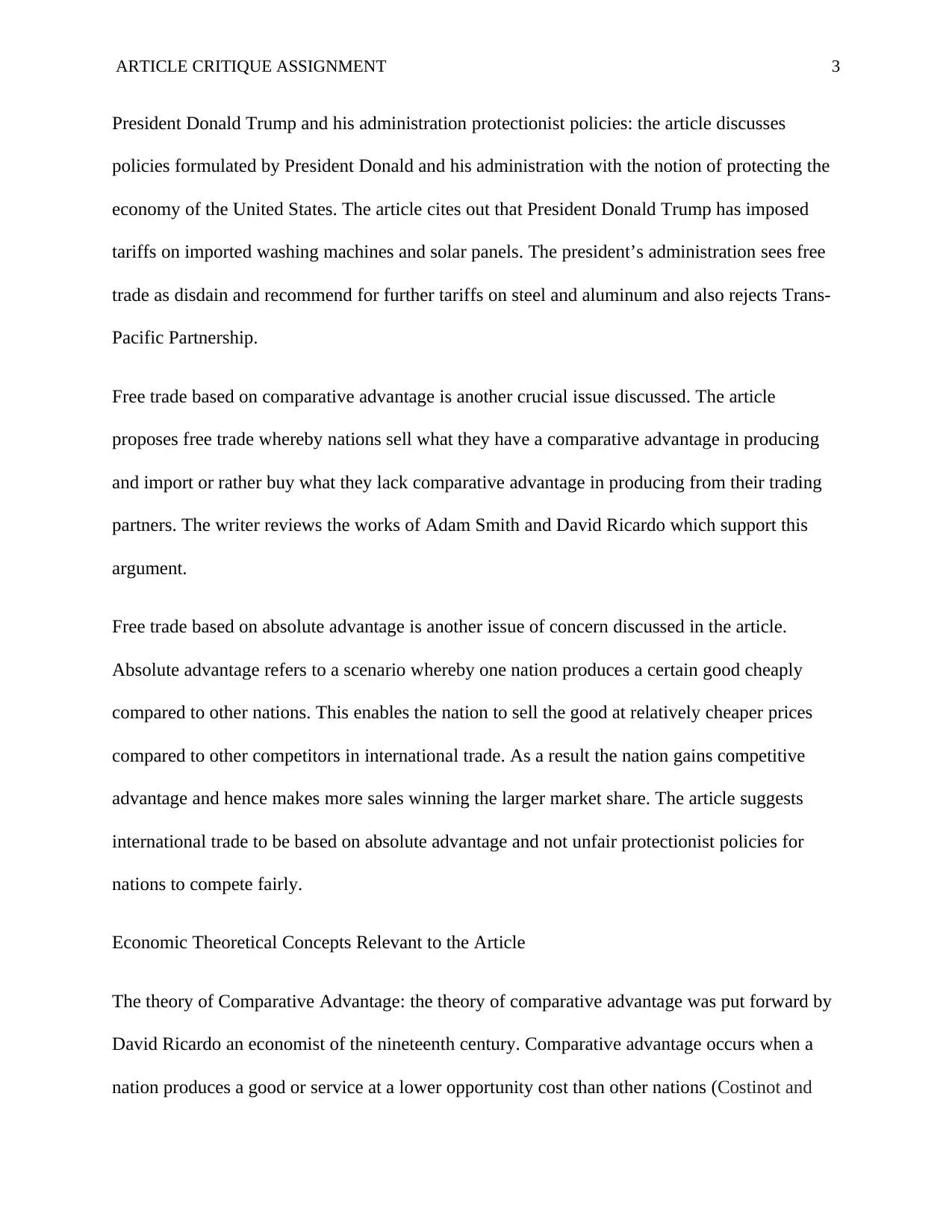
ARTICLE CRITIQUE ASSIGNMENT 3
President Donald Trump and his administration protectionist policies: the article discusses
policies formulated by President Donald and his administration with the notion of protecting the
economy of the United States. The article cites out that President Donald Trump has imposed
tariffs on imported washing machines and solar panels. The president’s administration sees free
trade as disdain and recommend for further tariffs on steel and aluminum and also rejects Trans-
Pacific Partnership.
Free trade based on comparative advantage is another crucial issue discussed. The article
proposes free trade whereby nations sell what they have a comparative advantage in producing
and import or rather buy what they lack comparative advantage in producing from their trading
partners. The writer reviews the works of Adam Smith and David Ricardo which support this
argument.
Free trade based on absolute advantage is another issue of concern discussed in the article.
Absolute advantage refers to a scenario whereby one nation produces a certain good cheaply
compared to other nations. This enables the nation to sell the good at relatively cheaper prices
compared to other competitors in international trade. As a result the nation gains competitive
advantage and hence makes more sales winning the larger market share. The article suggests
international trade to be based on absolute advantage and not unfair protectionist policies for
nations to compete fairly.
Economic Theoretical Concepts Relevant to the Article
The theory of Comparative Advantage: the theory of comparative advantage was put forward by
David Ricardo an economist of the nineteenth century. Comparative advantage occurs when a
nation produces a good or service at a lower opportunity cost than other nations (Costinot and
President Donald Trump and his administration protectionist policies: the article discusses
policies formulated by President Donald and his administration with the notion of protecting the
economy of the United States. The article cites out that President Donald Trump has imposed
tariffs on imported washing machines and solar panels. The president’s administration sees free
trade as disdain and recommend for further tariffs on steel and aluminum and also rejects Trans-
Pacific Partnership.
Free trade based on comparative advantage is another crucial issue discussed. The article
proposes free trade whereby nations sell what they have a comparative advantage in producing
and import or rather buy what they lack comparative advantage in producing from their trading
partners. The writer reviews the works of Adam Smith and David Ricardo which support this
argument.
Free trade based on absolute advantage is another issue of concern discussed in the article.
Absolute advantage refers to a scenario whereby one nation produces a certain good cheaply
compared to other nations. This enables the nation to sell the good at relatively cheaper prices
compared to other competitors in international trade. As a result the nation gains competitive
advantage and hence makes more sales winning the larger market share. The article suggests
international trade to be based on absolute advantage and not unfair protectionist policies for
nations to compete fairly.
Economic Theoretical Concepts Relevant to the Article
The theory of Comparative Advantage: the theory of comparative advantage was put forward by
David Ricardo an economist of the nineteenth century. Comparative advantage occurs when a
nation produces a good or service at a lower opportunity cost than other nations (Costinot and
⊘ This is a preview!⊘
Do you want full access?
Subscribe today to unlock all pages.

Trusted by 1+ million students worldwide
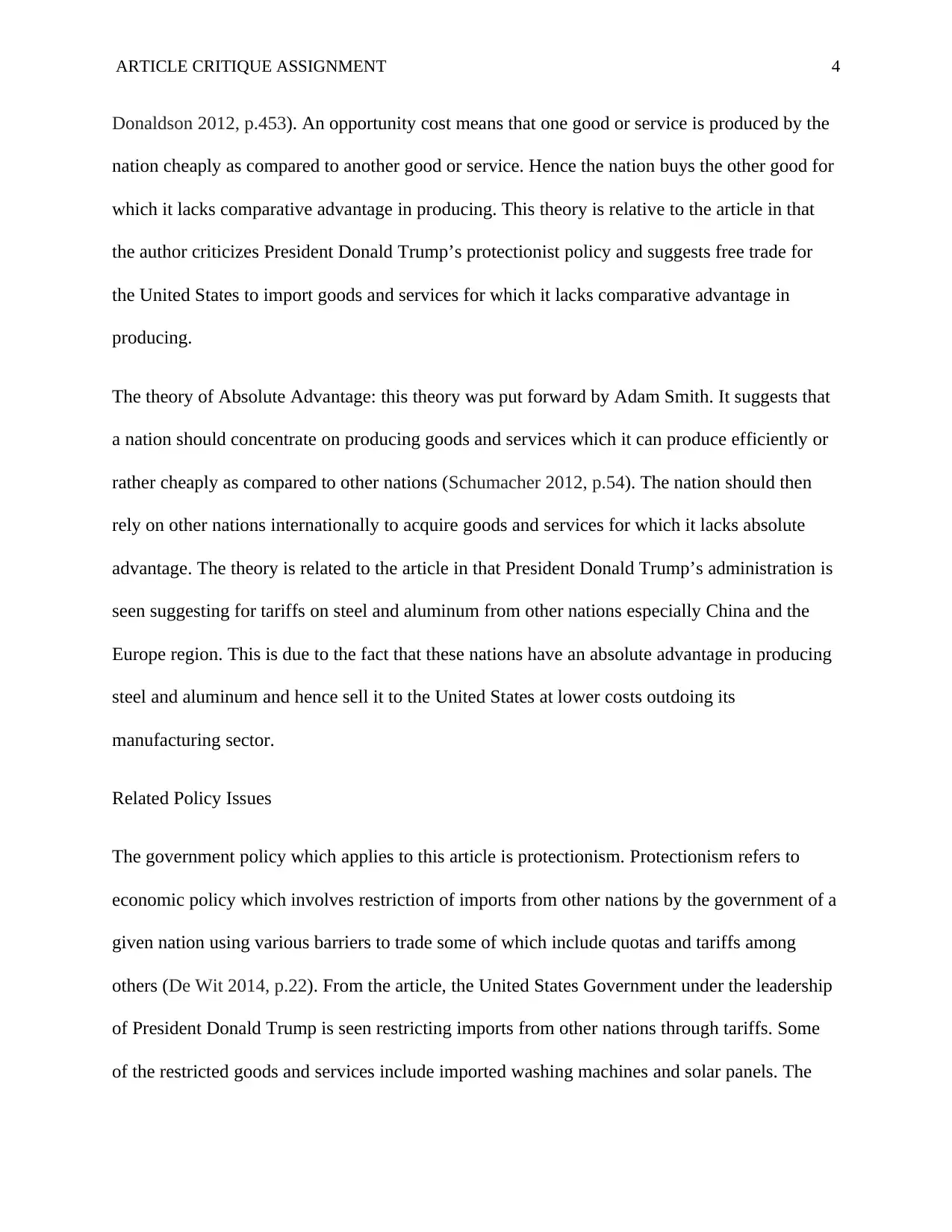
ARTICLE CRITIQUE ASSIGNMENT 4
Donaldson 2012, p.453). An opportunity cost means that one good or service is produced by the
nation cheaply as compared to another good or service. Hence the nation buys the other good for
which it lacks comparative advantage in producing. This theory is relative to the article in that
the author criticizes President Donald Trump’s protectionist policy and suggests free trade for
the United States to import goods and services for which it lacks comparative advantage in
producing.
The theory of Absolute Advantage: this theory was put forward by Adam Smith. It suggests that
a nation should concentrate on producing goods and services which it can produce efficiently or
rather cheaply as compared to other nations (Schumacher 2012, p.54). The nation should then
rely on other nations internationally to acquire goods and services for which it lacks absolute
advantage. The theory is related to the article in that President Donald Trump’s administration is
seen suggesting for tariffs on steel and aluminum from other nations especially China and the
Europe region. This is due to the fact that these nations have an absolute advantage in producing
steel and aluminum and hence sell it to the United States at lower costs outdoing its
manufacturing sector.
Related Policy Issues
The government policy which applies to this article is protectionism. Protectionism refers to
economic policy which involves restriction of imports from other nations by the government of a
given nation using various barriers to trade some of which include quotas and tariffs among
others (De Wit 2014, p.22). From the article, the United States Government under the leadership
of President Donald Trump is seen restricting imports from other nations through tariffs. Some
of the restricted goods and services include imported washing machines and solar panels. The
Donaldson 2012, p.453). An opportunity cost means that one good or service is produced by the
nation cheaply as compared to another good or service. Hence the nation buys the other good for
which it lacks comparative advantage in producing. This theory is relative to the article in that
the author criticizes President Donald Trump’s protectionist policy and suggests free trade for
the United States to import goods and services for which it lacks comparative advantage in
producing.
The theory of Absolute Advantage: this theory was put forward by Adam Smith. It suggests that
a nation should concentrate on producing goods and services which it can produce efficiently or
rather cheaply as compared to other nations (Schumacher 2012, p.54). The nation should then
rely on other nations internationally to acquire goods and services for which it lacks absolute
advantage. The theory is related to the article in that President Donald Trump’s administration is
seen suggesting for tariffs on steel and aluminum from other nations especially China and the
Europe region. This is due to the fact that these nations have an absolute advantage in producing
steel and aluminum and hence sell it to the United States at lower costs outdoing its
manufacturing sector.
Related Policy Issues
The government policy which applies to this article is protectionism. Protectionism refers to
economic policy which involves restriction of imports from other nations by the government of a
given nation using various barriers to trade some of which include quotas and tariffs among
others (De Wit 2014, p.22). From the article, the United States Government under the leadership
of President Donald Trump is seen restricting imports from other nations through tariffs. Some
of the restricted goods and services include imported washing machines and solar panels. The
Paraphrase This Document
Need a fresh take? Get an instant paraphrase of this document with our AI Paraphraser
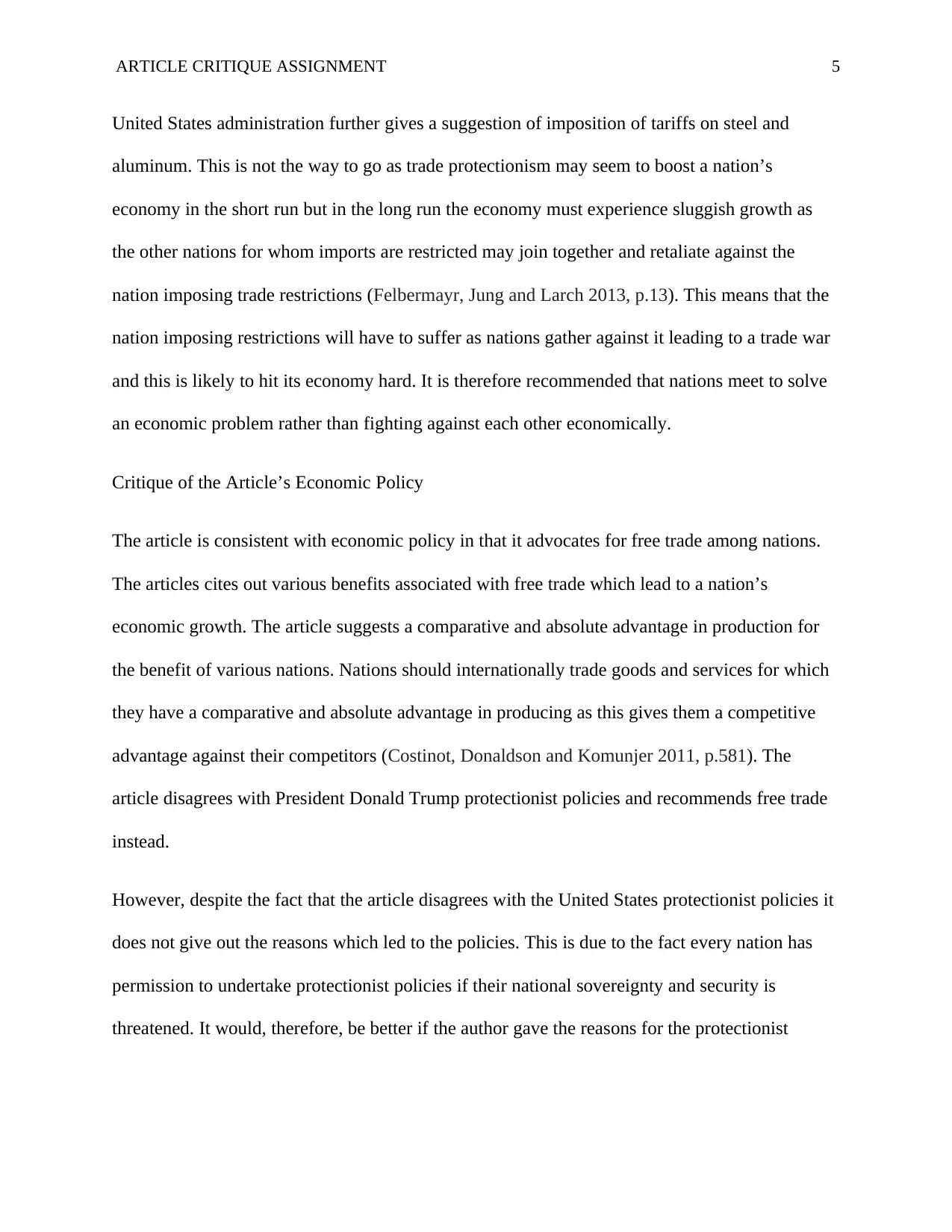
ARTICLE CRITIQUE ASSIGNMENT 5
United States administration further gives a suggestion of imposition of tariffs on steel and
aluminum. This is not the way to go as trade protectionism may seem to boost a nation’s
economy in the short run but in the long run the economy must experience sluggish growth as
the other nations for whom imports are restricted may join together and retaliate against the
nation imposing trade restrictions (Felbermayr, Jung and Larch 2013, p.13). This means that the
nation imposing restrictions will have to suffer as nations gather against it leading to a trade war
and this is likely to hit its economy hard. It is therefore recommended that nations meet to solve
an economic problem rather than fighting against each other economically.
Critique of the Article’s Economic Policy
The article is consistent with economic policy in that it advocates for free trade among nations.
The articles cites out various benefits associated with free trade which lead to a nation’s
economic growth. The article suggests a comparative and absolute advantage in production for
the benefit of various nations. Nations should internationally trade goods and services for which
they have a comparative and absolute advantage in producing as this gives them a competitive
advantage against their competitors (Costinot, Donaldson and Komunjer 2011, p.581). The
article disagrees with President Donald Trump protectionist policies and recommends free trade
instead.
However, despite the fact that the article disagrees with the United States protectionist policies it
does not give out the reasons which led to the policies. This is due to the fact every nation has
permission to undertake protectionist policies if their national sovereignty and security is
threatened. It would, therefore, be better if the author gave the reasons for the protectionist
United States administration further gives a suggestion of imposition of tariffs on steel and
aluminum. This is not the way to go as trade protectionism may seem to boost a nation’s
economy in the short run but in the long run the economy must experience sluggish growth as
the other nations for whom imports are restricted may join together and retaliate against the
nation imposing trade restrictions (Felbermayr, Jung and Larch 2013, p.13). This means that the
nation imposing restrictions will have to suffer as nations gather against it leading to a trade war
and this is likely to hit its economy hard. It is therefore recommended that nations meet to solve
an economic problem rather than fighting against each other economically.
Critique of the Article’s Economic Policy
The article is consistent with economic policy in that it advocates for free trade among nations.
The articles cites out various benefits associated with free trade which lead to a nation’s
economic growth. The article suggests a comparative and absolute advantage in production for
the benefit of various nations. Nations should internationally trade goods and services for which
they have a comparative and absolute advantage in producing as this gives them a competitive
advantage against their competitors (Costinot, Donaldson and Komunjer 2011, p.581). The
article disagrees with President Donald Trump protectionist policies and recommends free trade
instead.
However, despite the fact that the article disagrees with the United States protectionist policies it
does not give out the reasons which led to the policies. This is due to the fact every nation has
permission to undertake protectionist policies if their national sovereignty and security is
threatened. It would, therefore, be better if the author gave the reasons for the protectionist
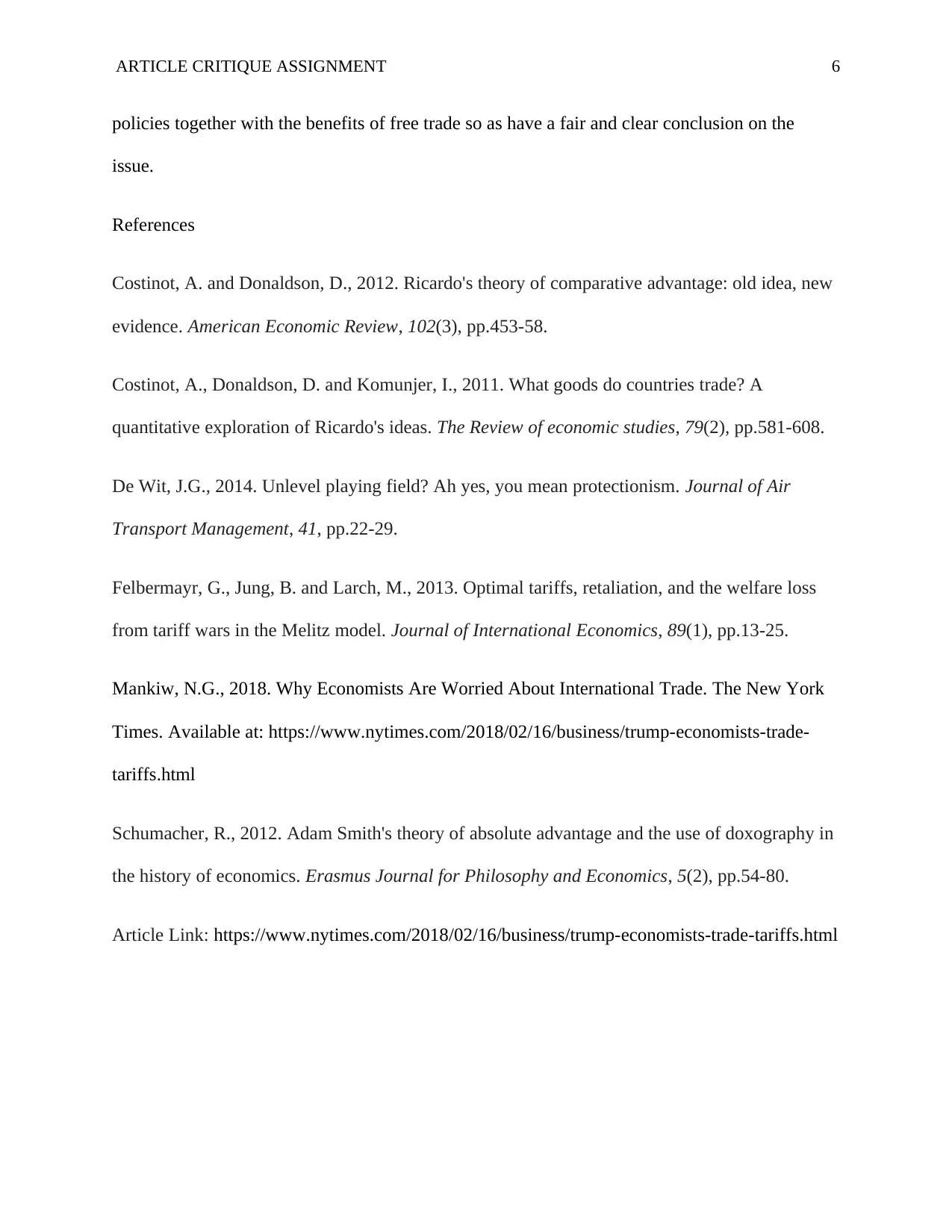
ARTICLE CRITIQUE ASSIGNMENT 6
policies together with the benefits of free trade so as have a fair and clear conclusion on the
issue.
References
Costinot, A. and Donaldson, D., 2012. Ricardo's theory of comparative advantage: old idea, new
evidence. American Economic Review, 102(3), pp.453-58.
Costinot, A., Donaldson, D. and Komunjer, I., 2011. What goods do countries trade? A
quantitative exploration of Ricardo's ideas. The Review of economic studies, 79(2), pp.581-608.
De Wit, J.G., 2014. Unlevel playing field? Ah yes, you mean protectionism. Journal of Air
Transport Management, 41, pp.22-29.
Felbermayr, G., Jung, B. and Larch, M., 2013. Optimal tariffs, retaliation, and the welfare loss
from tariff wars in the Melitz model. Journal of International Economics, 89(1), pp.13-25.
Mankiw, N.G., 2018. Why Economists Are Worried About International Trade. The New York
Times. Available at: https://www.nytimes.com/2018/02/16/business/trump-economists-trade-
tariffs.html
Schumacher, R., 2012. Adam Smith's theory of absolute advantage and the use of doxography in
the history of economics. Erasmus Journal for Philosophy and Economics, 5(2), pp.54-80.
Article Link: https://www.nytimes.com/2018/02/16/business/trump-economists-trade-tariffs.html
policies together with the benefits of free trade so as have a fair and clear conclusion on the
issue.
References
Costinot, A. and Donaldson, D., 2012. Ricardo's theory of comparative advantage: old idea, new
evidence. American Economic Review, 102(3), pp.453-58.
Costinot, A., Donaldson, D. and Komunjer, I., 2011. What goods do countries trade? A
quantitative exploration of Ricardo's ideas. The Review of economic studies, 79(2), pp.581-608.
De Wit, J.G., 2014. Unlevel playing field? Ah yes, you mean protectionism. Journal of Air
Transport Management, 41, pp.22-29.
Felbermayr, G., Jung, B. and Larch, M., 2013. Optimal tariffs, retaliation, and the welfare loss
from tariff wars in the Melitz model. Journal of International Economics, 89(1), pp.13-25.
Mankiw, N.G., 2018. Why Economists Are Worried About International Trade. The New York
Times. Available at: https://www.nytimes.com/2018/02/16/business/trump-economists-trade-
tariffs.html
Schumacher, R., 2012. Adam Smith's theory of absolute advantage and the use of doxography in
the history of economics. Erasmus Journal for Philosophy and Economics, 5(2), pp.54-80.
Article Link: https://www.nytimes.com/2018/02/16/business/trump-economists-trade-tariffs.html
⊘ This is a preview!⊘
Do you want full access?
Subscribe today to unlock all pages.

Trusted by 1+ million students worldwide
1 out of 6
Your All-in-One AI-Powered Toolkit for Academic Success.
+13062052269
info@desklib.com
Available 24*7 on WhatsApp / Email
![[object Object]](/_next/static/media/star-bottom.7253800d.svg)
Unlock your academic potential
Copyright © 2020–2026 A2Z Services. All Rights Reserved. Developed and managed by ZUCOL.

